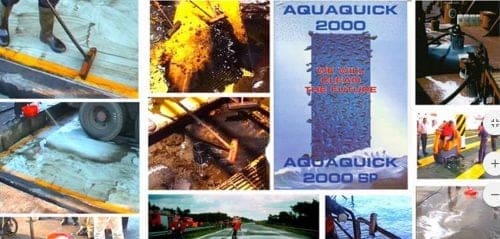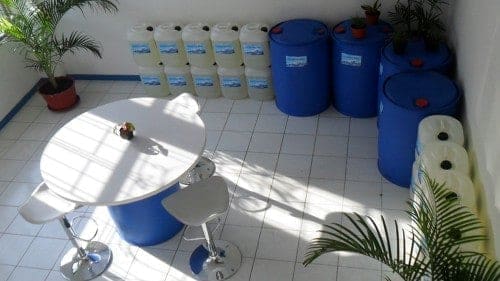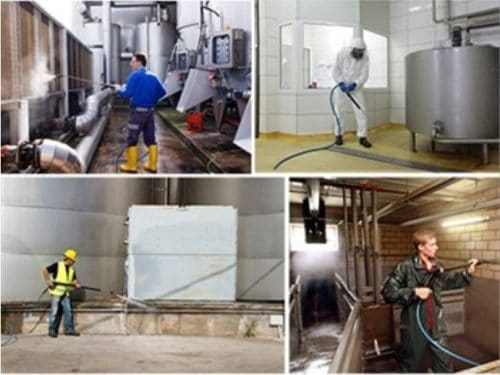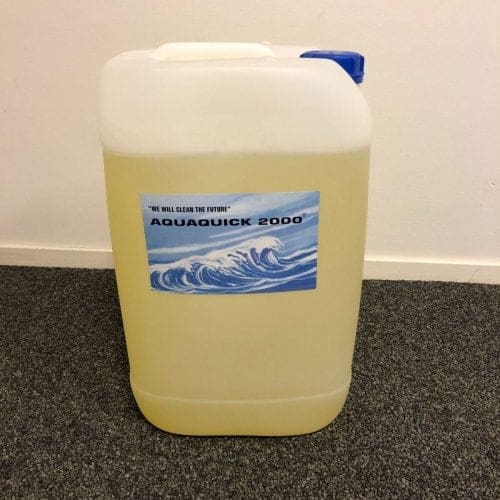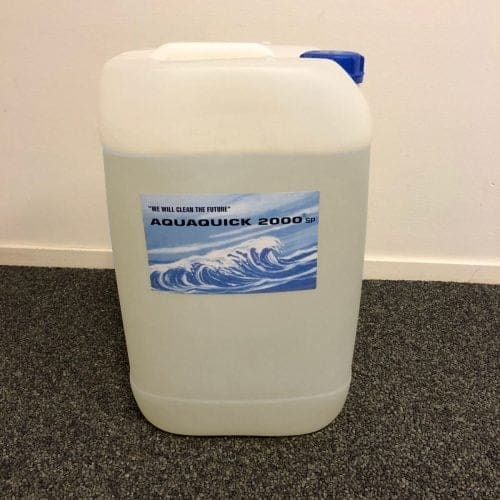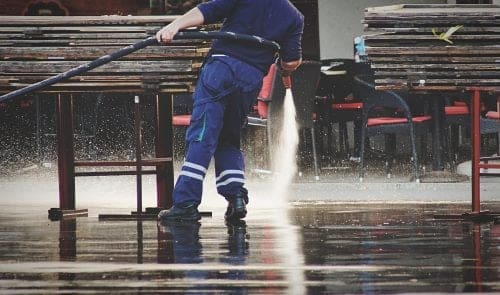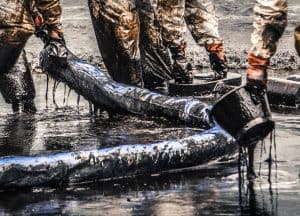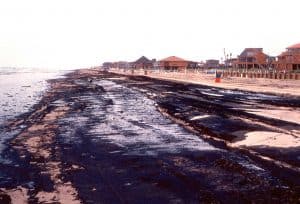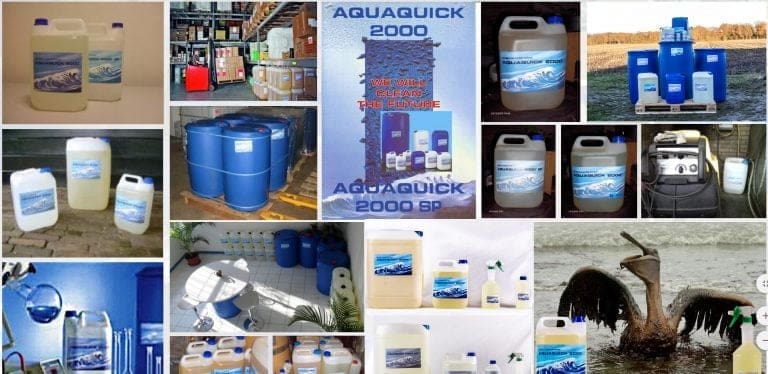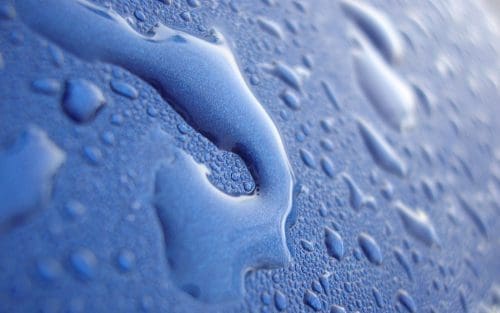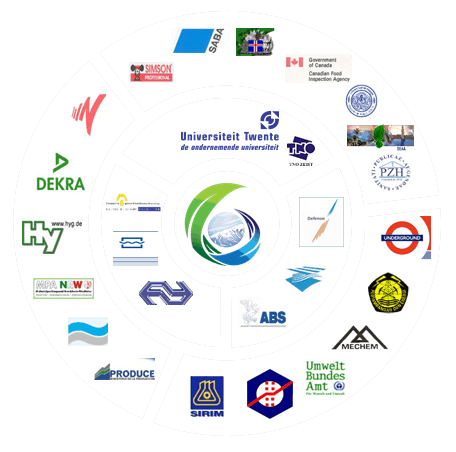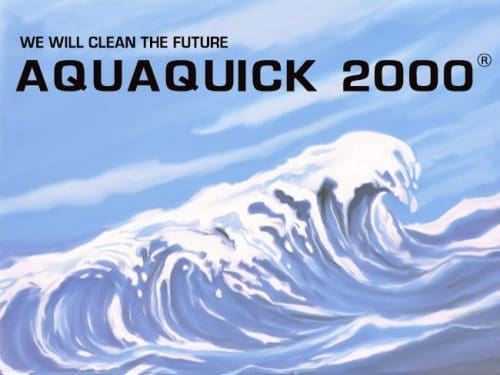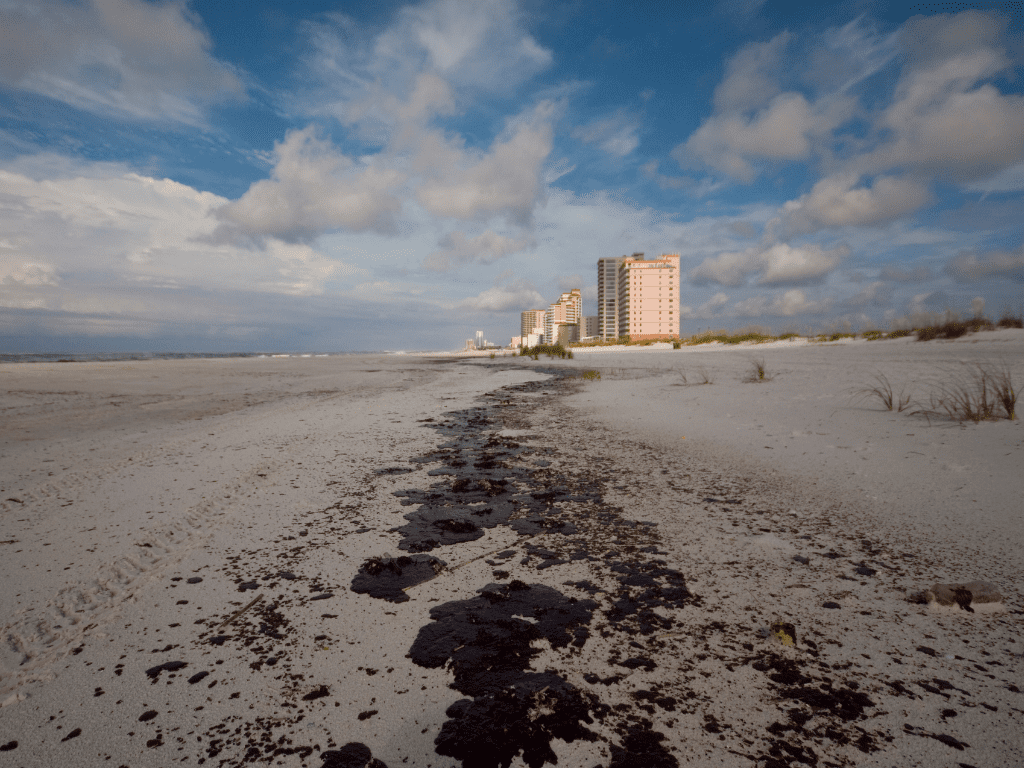Oil spills represent a grave threat to marine ecosystems, wildlife, and human communities, causing severe and lasting consequences. These spills can occur through various means, such as tanker accidents, pipeline leaks, drilling mishaps, and industrial activities, resulting in the release of petroleum hydrocarbons into the environment. The repercussions of oil spills are far-reaching, affecting marine habitats, wildlife, economies, and human health. Traditional cleanup methods often fall short, leading to the exploration of innovative and sustainable solutions.
These spills have a serious impact. In this journey, we’ll explore the different types of oil spills, see how they harm nature and people, and discover a promising solution called AQUAQUICK 2000—a special helper in our mission for a cleaner and happier planet.
Oil Spill Examples:
Landspill, seaspill, drainage spill, and various other forms of oil spills have inflicted profound damage on the environment. These spills manifest in different scenarios, each presenting unique challenges and consequences.
Landspill:
- Industrial Accidents: Landspills often result from industrial accidents where machinery failure, human error, or lack of safety measures lead to the unintended release of oil onto terrestrial environments.
- Storage Tank Leaks: Improperly maintained or corroded storage tanks can leak oil, causing landspills and contaminating soil and groundwater.
- Pipeline Ruptures: Accidental ruptures or breaches in pipelines can result in significant landspills, affecting nearby ecosystems and communities.
Seaspill:
- Tanker Collisions: Collisions involving oil tankers, either at sea or near coastal areas, can result in seaspills with devastating consequences for marine life and ecosystems.
- Offshore Drilling Mishaps: Failures in offshore drilling operations, such as blowouts or well ruptures, can lead to substantial seaspills, impacting vast expanses of the ocean.
- Shipwrecks: Shipwrecks, especially those involving vessels carrying large quantities of oil, can result in seaspills, posing immediate threats to coastal regions and marine biodiversity.
Drainage Spill:
- Urban Runoff: Urban areas with improper waste disposal systems can contribute to drainage spills as rainwater washes oil residues from streets into drainage systems.
- Agricultural Runoff: The use of oil-based pesticides and fertilizers in agriculture can contribute to drainage spills, affecting water bodies downstream and harming aquatic ecosystems.
- Illegal Dumping: Deliberate illegal dumping of oil into drainage systems by individuals or industries contributes to drainage spills, posing risks to water quality and aquatic life.
Rail and Road Spills:
- Transport Accidents: Accidents involving trains or trucks carrying oil can lead to spills on roads and railways, impacting nearby soil, water, and vegetation.
- Infrastructure Failures: Aging or poorly maintained transportation infrastructure may result in leaks and spills during the transit of oil, leading to environmental contamination.
Industrial Site Spills:
- Factory Operations: Oil spills can occur in industrial facilities due to equipment malfunctions, storage tank leaks, or improper handling of oil-based materials.
- Power Plants: Oil spills can result from power plant operations, especially those using oil for energy production, impacting nearby water bodies and ecosystems.
Consequences of Oil Spills:
The devastating impact of oil spills includes the degradation of marine habitats, risks to wildlife, and disruptions to the livelihoods of communities dependent on marine resources. The toxicity of oil in water can lead to long-term ecological imbalances, contaminating food chains and impacting human health. Economically, spills can devastate fishing industries and tourism, causing significant financial losses.
Ecological Imbalances:
- Oil spills disrupt the delicate balance of marine ecosystems, leading to the decline of species and the destruction of habitats.
- The toxic substances in oil can persist in the environment, affecting the reproductive capabilities of marine life and hindering the natural recovery process.
Contamination of Food Chains:
- Oil spill residues accumulate in the food chain, impacting aquatic organisms and posing risks to human health through the consumption of contaminated seafood.
- Long-lasting effects on the food web can result in reduced biodiversity and ecosystem stability.
Human Health Impacts:
- Proximity to oil spill-affected areas can expose local communities to health hazards, including respiratory issues, skin problems, and long-term health concerns.
- Consuming contaminated seafood can lead to the ingestion of harmful substances, affecting the health of those dependent on marine resources.
Economic Devastation:
- Fishing industries and tourism, vital to many coastal communities, suffer significant financial losses due to oil spills.
- The long-term impact on these industries can lead to unemployment, economic downturns, and increased dependence on external aid.
Traditional Cleanup Methods:
Skimming, burning, and dispersants are traditional methods employed to clean up oil spills. However, these methods have drawbacks, including potential harm to the environment and limited effectiveness in certain conditions. As a result, there has been a growing demand for more sustainable and less intrusive solutions to address oil spills.
Skimming:
- Involves using barriers and equipment to physically remove the oil from the water’s surface.
- Limitations include inefficiency in rough seas, high operational costs, and the inability to address submerged oil.
Burning:
- Controlled burning of surface oil to reduce the volume and minimize its impact.
- Environmental concerns include air pollution, the release of toxic fumes, and incomplete combustion.
Dispersants:
- Chemical agents used to break down oil into smaller droplets, promoting faster natural degradation.
- Drawbacks include potential harm to marine life, persistence in the environment, and limited effectiveness in certain conditions.
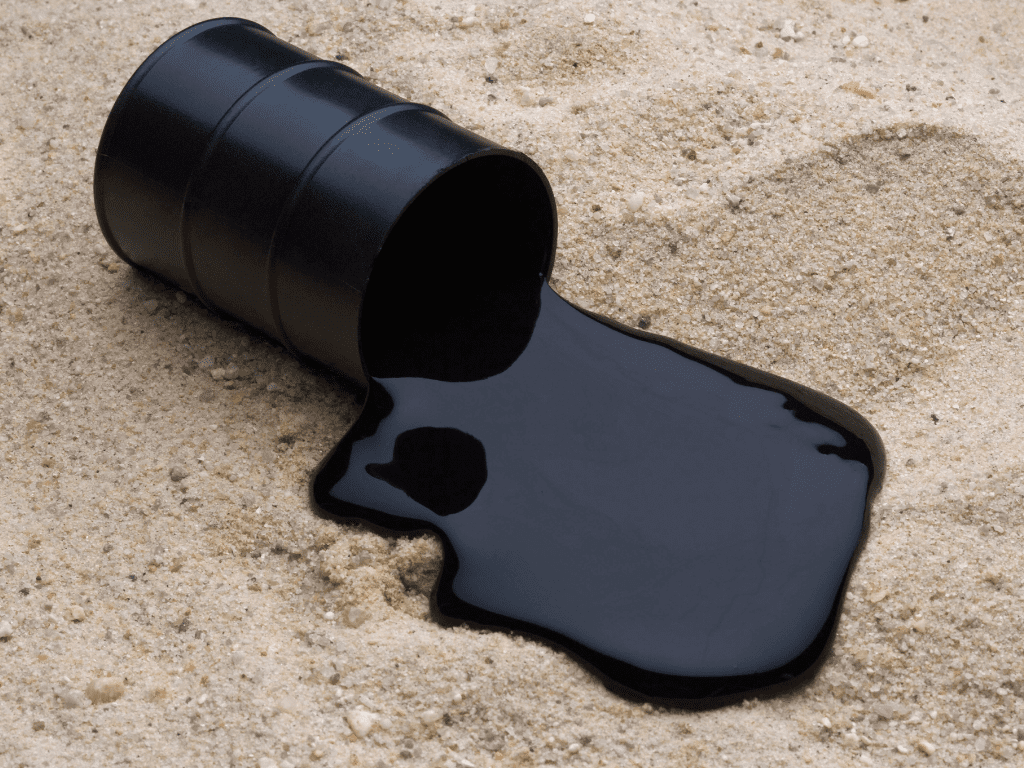
AQUAQUICK 2000: A Sustainable Solution:
AQUAQUICK 2000 emerges as a revolutionary product in the fight against oil spills. Developed as a response to environmental needs, it is an eco-friendly, water-based cleaning solution comprising ecological materials and plant extracts. This product is designed to target all types of hydrocarbons, including animal, vegetable, synthetic, and mineral oils and greases, providing an effective cleanup while minimizing environmental impact.
Eco-Friendly and Safe:
One of the key features of AQUAQUICK 2000 is its unique composition, ensuring its safety for the environment and human health. It is non-toxic to aquatic organisms and does not harm metals, plastics, paints, or rubbers. Its biodegradable nature means it breaks down into harmless substances, significantly reducing ecological damage.
Bioremediation Process:
AQUAQUICK 2000 utilizes the natural process of bioremediation, stimulating the growth of bacteria and microorganisms that feed on hydrocarbons. These organisms convert the oil into carbon dioxide, water, and biomass, effectively neutralizing the pollutant’s impact. This method not only proves efficient but also supports the natural recovery of ecosystems.
Proven Track Record:
Since its launch, AQUAQUICK 2000 has demonstrated success in numerous oil spill scenarios. Its effectiveness spans diverse environments, from oceans and rivers to industrial sites, making it a reliable choice for environmental cleanup operations.
Application of AQUAQUICK 2000:
The application of AQUAQUICK 2000 is straightforward. It needs to be diluted with water, with flexibility in ratios depending on the severity of the spill. This adaptability makes AQUAQUICK 2000 suitable for various situations, ranging from small-scale leaks to large maritime spills.
Preventing Oil Spills:
Preventing oil spills is crucial for environmental conservation. Regular maintenance of oil infrastructure, stringent safety protocols in industrial activities, and the use of advanced technologies can help reduce the risk of oil spills. Additionally, the adoption of eco-friendly cleaning solutions like AQUAQUICK 2000 can contribute to a cleaner and more sustainable future.
Regular Maintenance:
- Implementing routine inspections and maintenance of oil infrastructure to identify and address potential leaks or weaknesses.
- Utilizing advanced monitoring systems to detect anomalies and prevent spills before they occur.
Stringent Safety Protocols:
- Enforcing strict safety measures during oil extraction, transportation, and storage to minimize the likelihood of accidents.
- Providing comprehensive training for personnel involved in oil-related activities to enhance safety awareness.
Advanced Technologies:
- Investing in and implementing cutting-edge technologies such as leak detection sensors, satellite monitoring, and robotic inspection systems.
- Integrating artificial intelligence to predict potential risks and proactively address them before they escalate.
Legislation and Regulation:
- Establishing and enforcing stringent environmental regulations and penalties to deter negligence and ensure compliance.
- Encouraging the development and adoption of environmentally friendly technologies through incentives and supportive policies.
Conclusion:
The challenge of oil spills necessitates innovative and responsible solutions, and AQUAQUICK 2000 stands out as a significant advancement in environmental protection technology. Its ability to efficiently tackle oil spills while preserving ecological balance makes it an indispensable tool in the ongoing effort to safeguard our planet’s water resources. As we strive for a cleaner future, the adoption of eco-friendly solutions like AQUAQUICK 2000 becomes imperative in mitigating the impact of oil spills on our precious ecosystems.

